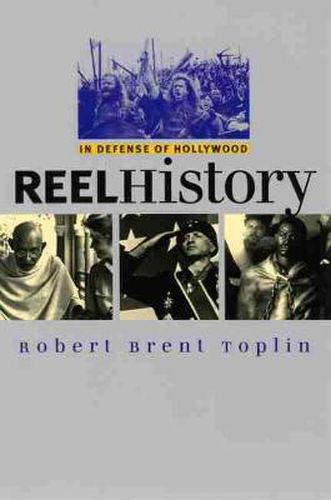Readings Newsletter
Become a Readings Member to make your shopping experience even easier.
Sign in or sign up for free!
You’re not far away from qualifying for FREE standard shipping within Australia
You’ve qualified for FREE standard shipping within Australia
The cart is loading…






History has been fodder for cinema from the silent era to the blockbuster present, a fact that has seldom pleased historians themselves. As pundits increasingly ponder how Hollywood fails history , Robert Toplin counters with a provocative alternative approach to this enduring debate over the portrayal of history in film. Toplin focuses on movies released since 1985 - during which 12 historical films won the Oscar for Best Picture - and argues that critics often fail to recognize the unique ways in which fictional films communicate important ideas about the past. His work establishes commonsense ground rules for improving critical analysis in this area. Citing films like Gladiator and Braveheart , Gandhi and Nixon , he underscores the pressures placed on filmmakers to simplify and alter historical fact to conform to the demands of an extraordinarily expensive mass medium. Toplin demonstrates how a historical epic like Glory may contain creative adjustments that worry historians but shows how its distortions communicate broader and deeper truths about the Civil War experiences of African Americans - just as Saving Private Ryan presented little factual detail about World War II and yet effectively conveyed the experience of combat. He also shows how other films - such as Mississippi Burning , Amistad and The Hurricane - contain so many elements of fictional excess and oversimplification that they deserve the criticism they receive. Toplin draws upon his own experiences in film production and takes direct aim at writing about film dominated by jargonistic theory and empty rhetoric. He urges film studies scholars to move beyond their preoccupation with formal aesthetics and recognize that, in historical films, content does matter.
$9.00 standard shipping within Australia
FREE standard shipping within Australia for orders over $100.00
Express & International shipping calculated at checkout
History has been fodder for cinema from the silent era to the blockbuster present, a fact that has seldom pleased historians themselves. As pundits increasingly ponder how Hollywood fails history , Robert Toplin counters with a provocative alternative approach to this enduring debate over the portrayal of history in film. Toplin focuses on movies released since 1985 - during which 12 historical films won the Oscar for Best Picture - and argues that critics often fail to recognize the unique ways in which fictional films communicate important ideas about the past. His work establishes commonsense ground rules for improving critical analysis in this area. Citing films like Gladiator and Braveheart , Gandhi and Nixon , he underscores the pressures placed on filmmakers to simplify and alter historical fact to conform to the demands of an extraordinarily expensive mass medium. Toplin demonstrates how a historical epic like Glory may contain creative adjustments that worry historians but shows how its distortions communicate broader and deeper truths about the Civil War experiences of African Americans - just as Saving Private Ryan presented little factual detail about World War II and yet effectively conveyed the experience of combat. He also shows how other films - such as Mississippi Burning , Amistad and The Hurricane - contain so many elements of fictional excess and oversimplification that they deserve the criticism they receive. Toplin draws upon his own experiences in film production and takes direct aim at writing about film dominated by jargonistic theory and empty rhetoric. He urges film studies scholars to move beyond their preoccupation with formal aesthetics and recognize that, in historical films, content does matter.